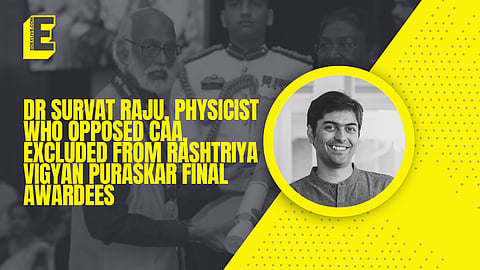

The final list of the Central Government’s Rashtriya Vigyan Puraskar or National Science Awards, which were given out yesterday, August 22 has raised some eyebrows — but not because of who was included in the list. The list is garnering criticism because of who was left out of it.
According to a report by The Telegraph, the list prepared by the selection committee and the final approved list are vastly different from each other. One of the people in the initial list, whose exclusion has become particularly controversial is Dr Suvrat Raju.
Who is Dr Suvrat Raju?
Dr Raju is a physicist and a professor at the International Centre for Theoretical Studies, Tata Institute of Fundamental Research.
Best known for his research on black holes, Dr Raju is the recipient of several prestigious awards for science, including the Nishina Asia Award in 2022, the International Centre for Theoretical Physics in 2019, The Indian National Science Academy medal for Young Scientists in 2013, and more. He was also included in the Asian Scientist 100 list in 2020.
It is speculated that Dr Raju’s name was removed from the list due to his criticism of the government and the ruling Bharatiya Janta Party.
Punished for dissenting?
Dr Raju was one of the 1,992 scientists and scholars who signed an open statement against the Citizenship Amendment Act (CAA) in December 2019.
The letter, whose signatories include academics from the Indian Institutes of Technology (IITs), National Law Schools, central universities like the English and Foreign Languages University (EFLU), Jawaharlal Nehru University (JNU) and Delhi University (DU), and Foreign Universities like Harvard University, Rutgers University, and the University of Yale, stated that the act was a spiritual violation of Article 14 of the Indian Constitution.
“The use of religion as a criterion for citizenship in the proposed bill would mark a radical break with this history and would be inconsistent with the basic structure of the constitution,” the letter read.
Dr Raju was also seen actively participating in the protests against the act and speaking against it on several panel discussions and platforms.
Upon the exclusion of Dr Raju, many scientists took to social media, particularly X to condemn this development, claiming that it was based on “non-science factors”.
A report by The Wire Science reveals that many scientists from public institutes and universities, who signed the letter, claim they are being targeted by their institutions' administrations and, by extension, the BJP-led central government.
A champion of academic freedom
In this vein, Dr Raju has on several occasions championed the right to freedom of speech and expression and held that talking about socio-political issues is something scientists must not shy away from.
In an article for Scientific American, Dr Raju wrote about the dwindling academic freedom on campuses, and how the BJP-led government has been using draconian tactics to suppress freedom of thought and expression. Advocating for scientists to resist such attacks, he said, “The Indian scientific community must anticipate a broader onslaught and organize itself robustly to defend justice in society, and the freedom of expression and thought in academic spaces.”
Similarly, he called for scientists and scientific organisations to speak out on social issues, and use scientific knowledge for the betterment of the people in a 2023 opinion piece for The Hindu.
Invoking the examples of scientists like DD Kosambi, Dr Raju wrote, “...scientific issues are often related to broader political issues, and society has benefitted from the participation of scientists in such discussions.”
Along with academic freedom, Dr Raju has also spoken and acted against academic gatekeeping and stressed the need for access to academic research.
When invited to review a manuscript by Nature Communication, an open-access scientific journal, he declined due to the high open-access fees charged by Springer-Nature, the parent company of the journal.
What is Rashtriya Vigyan Puraskar?
Introduced this year, the Rashtriya Vigyan Puraskars are given to scientists who have made lifetime contributions to any field of Science and Technology.
Rashtriya Vigyan Puraskar 2024 saw 33 awards being given to distinguished scientists across four categories by Droupadi Murmu, President of India yesterday at the Rashtrapati Bhavan.
